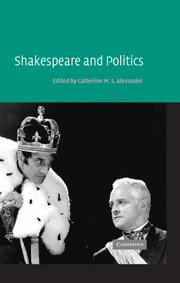Book contents
- Frontmatter
- Contents
- List of contributors
- Editor's note
- 1 Shakespeare and politics: an introduction
- 2 Shakespeare and politics
- 3 Henry VIII and the deconstruction of history
- 4 Livy, Machiavelli, and Shakespeare's Coriolanus
- 5 Richard II and the realities of power
- 6 Plutarch, insurrection, and dearth in Coriolanus
- 7 Some versions of coup d'état, rebellion, and revolution
- 8 Language, politics, and poverty in Shakespearian drama
- 9 ‘Demystifying the mystery of state’: King Lear and the world upside down
- 10 Venetian culture and the politics of Othello
- 11 The Bard and Ireland: Shakespeare's Protestantism as politics in disguise
- 12 Henry V as working-house of ideology
- 13 ‘Fashion it thus’: Julius Caesar and the politics of theatrical representation
- 14 Take me to your Leda
- 15 Macbeth on film: politics
- 16 William Shakespeare's Romeo + Juliet: everything's nice in America?
- Index
2 - Shakespeare and politics
Published online by Cambridge University Press: 05 June 2012
- Frontmatter
- Contents
- List of contributors
- Editor's note
- 1 Shakespeare and politics: an introduction
- 2 Shakespeare and politics
- 3 Henry VIII and the deconstruction of history
- 4 Livy, Machiavelli, and Shakespeare's Coriolanus
- 5 Richard II and the realities of power
- 6 Plutarch, insurrection, and dearth in Coriolanus
- 7 Some versions of coup d'état, rebellion, and revolution
- 8 Language, politics, and poverty in Shakespearian drama
- 9 ‘Demystifying the mystery of state’: King Lear and the world upside down
- 10 Venetian culture and the politics of Othello
- 11 The Bard and Ireland: Shakespeare's Protestantism as politics in disguise
- 12 Henry V as working-house of ideology
- 13 ‘Fashion it thus’: Julius Caesar and the politics of theatrical representation
- 14 Take me to your Leda
- 15 Macbeth on film: politics
- 16 William Shakespeare's Romeo + Juliet: everything's nice in America?
- Index
Summary
There has not been an age so sympathetic as the present to the study of the political content and the political context of Shakespeare's plays. Politics are now everywhere in literary criticism. In Shakespeare's time men followed Aristotle and applied the language of what we regard as private ethics to the conduct of public life: today's critics, when they give currency to a term such as ‘sexual politics’, extend the language of public life to private ethics. Even if we restrict ourselves, as I shall, to a more traditional definition of politics, we notice the transformation of critical approaches that the past half century has brought. Who would now doubt that the behaviour of men in public life was a theme to engage Shakespeare's interest, and to stretch his powers, to the full? Who would assume, as John Palmer did in his Political Characters of Shakespeare in 1945, that Shakespeare was ‘forced’ by the public demand for history plays to ‘take the political field’ (p. vi)?
On the face of it, the new political awareness ought to add to our understanding of Shakespeare. In the sixteenth and seventeenth centuries the relationship between literature and politics had an intimacy which the modern world has lost. Writers and politicians were so often the same people. The interaction of political and literary aspirations in the career of a Sir Thomas More or a Sir Thomas Wyatt or a Sir Philip Sidney, or of a John Milton or an Andrew Marvell, is so insistent that we cannot hope to understand the one without the other.
- Type
- Chapter
- Information
- Shakespeare and Politics , pp. 22 - 43Publisher: Cambridge University PressPrint publication year: 2004
- 2
- Cited by

